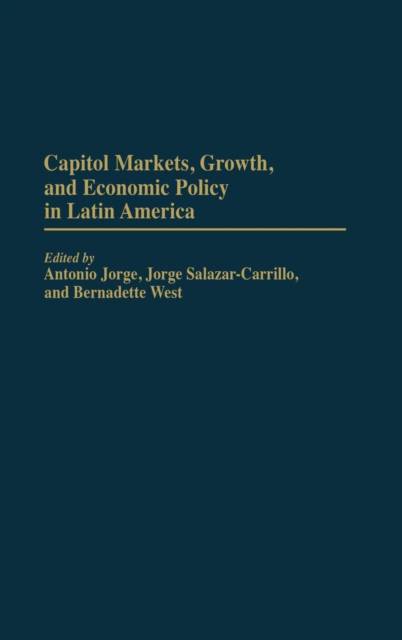
En raison d'une grêve chez bpost, votre commande pourrait être retardée. Vous avez besoin d’un livre rapidement ? Nos magasins vous accueillent à bras ouverts !
- Retrait gratuit dans votre magasin Club
- 7.000.000 titres dans notre catalogue
- Payer en toute sécurité
- Toujours un magasin près de chez vous
En raison de la grêve chez bpost, votre commande pourrait être retardée. Vous avez besoin d’un livre rapidement ? Nos magasins vous accueillent à bras ouverts !
- Retrait gratuit dans votre magasin Club
- 7.000.0000 titres dans notre catalogue
- Payer en toute sécurité
- Toujours un magasin près de chez vous
Capital Markets, Growth, and Economic Policy in Latin America
Jorge Salazar-Carrillo, Antonio Jorge, Bernadette West
Livre relié | Anglais
161,45 €
+ 322 points
Description
Looking at how Latin American countries have coped with the 1994 Mexican crisis and the earlier debt crisis of the 1980s, this book reveals the full extent of what has come to be known as the tequila effect. Written by distinguished economists and financiers from Latin America, the Caribbean, and the United States, the volume also examines the social, political, and economic issues associated with ever-expanding trade and globalization.
The book opens with chapters considering the impact of the Mexican crisis on Argentina, Colombia, and Venezuela, and it provides an interesting account of the events leading up to the crisis itself. In the following section, the contributors examine issues of economic growth by considering such topics as the need for a new growth strategy, by comparing the Latin American and Asian economies, and by looking at the Cuban economy from a trading partner's perspective. The final section takes an indepth look at the complex issues of neoliberalist versus neopopulist thinking in shaping Latin America's economic policies for the 21st century.Spécifications
Parties prenantes
- Auteur(s) :
- Editeur:
Contenu
- Nombre de pages :
- 240
- Langue:
- Anglais
Caractéristiques
- EAN:
- 9780275959753
- Date de parution :
- 30-01-00
- Format:
- Livre relié
- Format numérique:
- Genaaid
- Dimensions :
- 163 mm x 244 mm
- Poids :
- 571 g

Les avis
Nous publions uniquement les avis qui respectent les conditions requises. Consultez nos conditions pour les avis.






